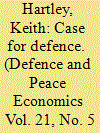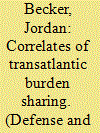| Srl | Item |
| 1 |
ID:
100954


|
|
|
|
|
| Publication |
2010.
|
| Summary/Abstract |
What is the case for defence and is it a worthwhile investment? This question is addressed for two contrasting nations, namely, the UK and New Zealand. Economists have a set of standard analytical tools for addressing the question but they are difficult to operationalise. This paper provides policy-relevant answers.
|
|
|
|
|
|
|
|
|
|
|
|
|
|
|
|
| 2 |
ID:
154334


|
|
|
|
|
| Summary/Abstract |
While recent work has attempted to update the research agenda for transatiantic defense burden-sharing, there remain significant gaps between the public choice defense economics literature and the security studies literature. The presence of such a gap is unfortunate, because defense spending choices are likely shaped by factors identified by the public choice literature, as well as the strategic and cultural variables that the security studies literature tends to focus on, as well as domestic macroeconomic factors. The independent variables identified in recent qualitative literature are extremely useful analytically, and, fortunately, they have reasonable proxies in available quantitative data, which enables scholars to study them across large groups of countries and many years. This article builds upon such work to synthesize the most notable of the factors identified in the current literature, and offers some common analytical ground that will benefit both scholars and practitioners..
|
|
|
|
|
|
|
|
|
|
|
|
|
|
|
|
| 3 |
ID:
083121


|
|
|
|
|
| Publication |
2008.
|
| Summary/Abstract |
Soeharto used the Indonesian bureaucracy to generate rents that could be harvested by 'insider' firms, while also encouraging it to extort money from 'outsider' firms and individuals. This necessitated incentives that would ensure strong loyalty and minimize internal opposition. Government entities were provided with insufficient budget funding to cover their costs, and their officials were expected to generate cash from illegal activities, making public sector employees financially dependent on corruption. Any employee who opposed this system could expect to be restricted to earning no more than the pitifully low formal salary entitlement. The system therefore became strongly self-reinforcing.
|
|
|
|
|
|
|
|
|
|
|
|
|
|
|
|